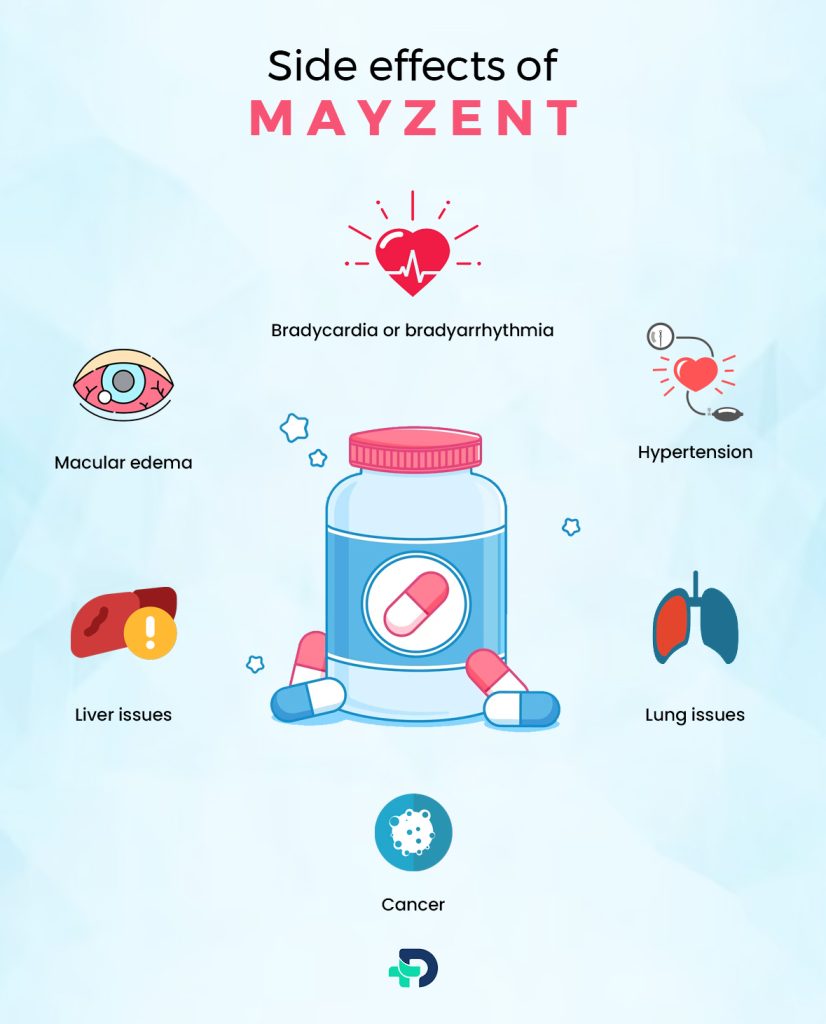Mayzent: Uses, Side Effects, and Interactions

- Mayzent
- 07 Sep 2023
Introduction
What is Mayzent?
Mayzent (Siponimod) is classified as a sphingosine l-phosphate receptor modulator within the realm of medication.1Introduction | Researched based study from Food and Drug Administration Mayzent is indicated for the prevention of symptom episodes and the deceleration of disability progression in adult patients with relapsing-remitting forms of multiple sclerosis (MS), a neurological disorder characterized by impaired nerve function and associated symptoms such as muscle weakness, numbness, coordination difficulties, visual impairment, speech impairment, and bladder control issues. Mayzent functions by reducing the activity of immune cells that have the potential to induce harm to the nerves. The administration of Mayzent is contingent upon the presence of a particular genotype. The physician will do a genetic analysis on you.

Mechanism of action
How does Mayzent work?
- It is unknown how precisely Mayzent treats MS in your body.
- But it’s thought that the medication lowers lymphocyte levels in the central nervous system (which includes the brain and spinal cord).
- A white blood cell known as a lymphocyte, which is a component of your immune system, may be a factor in MS symptoms.
- Mayzent may lessen MS symptoms by reducing the amount of lymphocytes in the spinal cord and brain.
- Once you’ve taken your first dose of Mayzent, it will start working.
Administration
How is Mayzent taken?
- Mayzent is an orally administered tablet that is coated with a film.
- A five-day titration phase should precede the start of treatment. During this time, patients should receive doses of 0.25 mg on days 1 and 2, 0.5 mg on day 3, 0.75 mg on day 4, and 1.25 mg on day 5. 1Administration | Researched based study from Food and Drug Administration
- Subsequently, it is recommended to administer a maintenance dosage of 2 mg per day, commencing on the sixth day.
Uses
Uses of Mayzent
The following ailments are approved for treatment with Mayzent:
Clinically isolated syndrome (CIS)
- The initial signs of MS, lasts for at least 24 hours. But not all people 1Uses | Researched based study from Food and Drug Administration with CIS go on to develop MS.
MS with remission and relapse
- When you have relapsing-remitting MS (RRMS), the disease’s symptoms oscillate between periods of remission and relapse.
Active Secondary progressive MS
- RRMS is the precursor to this type of MS.
- Active refers to when your symptoms worsen or an MRI scan reveals that your MS is more active.
- However, eventually you might stop going into remission, and your symptoms can just keep getting worse.
- At this point, RRMS transforms into SPMS (secondary progressive MS).
Precautions
Precautions
Investigations
- Before beginning to take Mayzent, you might require certain medical examinations, such as blood tests, ECGs, eye tests to look for visual acuity, tests for liver and heart function, and skin examination. 1Precautions | Researched based study from Food and Drug Administration
Changes in heart rate
- Upon starting to take Siponimod, your heart rate may decrease. Your initial dosage might be given to you in a medical facility.
- After taking Mayzent for the first time, your heart rate and blood pressure may be continuously monitored for at least six hours.
Risk of Infections
- Siponimod has an impact on the immunological system. You could be more susceptible to infections, even deadly or serious ones.
- You will require routine examinations by your physician. After you stop using this medication, your risk of infection may persist for three to four weeks.
- Mayzent can drop blood lymphocyte counts, which increases the risk of potentially fatal infections.
Return or worsening of MS Symptoms
- Enquire with your physician prior to discontinuing Mayzent use for any reason. The symptoms of MS can come back if you stop taking Mayzent.
Rarely, after stopping Mayzent, some MS patients experienced worsening symptoms than they had before or during the medication’s course of treatment.
- Do not resume taking Mayzent without first consulting your doctor if you stop taking it. When you start taking this medicine again, you might need to be monitored by a doctor.
Mayzent and contraceptives
- Birth control should be used by women both during and for ten days following their last dose of Mayzent.
- This is due to the fact that Mayzent takes around ten days to completely leave your body after you stop taking it.
- If you engage in sexual activity and there’s a chance that you or your partner could get pregnant, discuss your contraception needs with your doctor before starting Mayzent.
In Pregnancy
- Pregnant women who use this medication run the risk of developmental problems, for which there is insufficient data.
- When given to a pregnant woman, it may harm the fetus as shown in animal research and the medication’s mode of action.
In Breastfeeding
- There is no enough data to conclude if Mayzent is safe to take during lactation.
- The drug was discovered in the breast milk of caregivers who took it while pregnant in animal experiments.
- If the patient on Mayzent is breastfeeding or is planning to breastfeed, talk with your doctor once.
Contraindications
Who should not be given Mayzent?
- Patients with a CYP2C9*3/*3 genotype and those who have experienced a cardiac event, uncontrolled angina, transient ischemic attack (TIA), or specific forms of heart failure within the previous six months should not take.
- Additionally, individuals with specific kinds of arrhythmias or heart blocks should not use it.
Side Effects

Side Effects
It can also have serious adverse effects, such as 2Side Effects | Researched based study from Food and Drug Administration
- Bradycardia or bradyarrhythmia: Where the pulse rate of the patient is less than normal (<60 beats per minute).
- Macular edema: collection of fluid in the layers of retina in eye ball
- Hypertension: Elevated blood pressure more than the normal limits, if it exceeds 140/90 mm of Hg consecutively will require intervention from your physician.
- Liver issues: which includes raised liver enzymes, elevated bilirubin levels.
- Lung issues: Difficulty in breathing, breathlessness etc.
- Cancers like squamous cell (SCC), melanoma, and basal cell carcinoma (BCC) can also result from it.
- When the Mayzent treatment is stopped, the MS symptoms and impairment may get much worse.
Overdose
Overdose
- The administration of Mayzent in quantities exceeding the recommended dosage has the potential to result in the manifestation of severe adverse reactions.
- One potential manifestation of an overdose is a reduction in heart rate.
- In the event of excessive administration of Mayzent, medical professionals may opt to conduct nightly monitoring to assess potential adverse effects on pulse and blood pressure, with the aim of preventing hypotension.
Interactions
Drug Interactions
Mayzent may have interactions with a number of different drugs. It may also interfere with specific foods and supplements. Various interactions can result in various outcomes. For example, certain combinations may impair a medication’s effectiveness. Additional combinations may intensify the adverse effects or increase their frequency.
- Your body’s fight against infection, known as your immune system, may be weakened. If you use this drug with other drugs that can impair your immune system, illnesses may come to you more frequently than normal. This might be harmful.
Drug Interaction with Immunomodulators
Medications that could impair your immune system include medications for cancer, like
- Alemtuzumab.
- Rituximab
- Etanercept
- Adalimumab
Drug Interaction with drugs acting on heart muscles
- When you initially start taking it, it may cause your heart rate to drop.
- Antiarrhythmic drugs, which are used for an abnormal heart rhythm, can help to lower the heart rate.
- Therefore, if you take these drugs with Mayzent, your heart rate could drop too low. This might be harmful.
- Some examples of drugs that can lower your heart rate include beta-blocker drugs, including sotalol, carvedilol, metoprolol and nebivolol.
Drug Interaction with Cytochrome inhibitors
- Mayzent is metabolized by CYP2C9 and CYP3A4 enzymes located in your liver. (Proteins called enzymes facilitate chemical reactions.)
- Excess accumulation of Mayzent in the body can occur from taking other drugs that inhibit the activity of these enzymes.
- Therefore, you should avoid using Mayzent with medications that CYP2C9 and CYP3A4 inhibit (block).
Drug Interaction with Cytochrome inducers
- Mayzent is metabolized by CYP2C9 and CYP3A4 enzymes located in your liver.
- There are medications that can accelerate the normal rate of these enzymes.
- These medications are known as inducers of CYP2C9 and CYP3A4.
- If you take these drugs with Mayzent, your body can break down Mayzent too quickly.
- Consequently, your body might not absorb the medication as much, which would make Mayzent less effective in treating your MS.
Drug interaction with Vaccines
- Live vaccinations should be avoided for at least 4 weeks following your last dosage of Mayzent. Live vaccines have a mild content of virus or bacteria.
- When in healthy individuals, they typically don’t cause infections. However, Mayzent may impair your immune system, making it more difficult for your body to combat the virus or bacteria.
- Therefore, receiving live vaccinations while taking Mayzent may make you susceptible to the illness you’re attempting to avoid.
Interaction with Alcohol
- The use of alcohol and Mayzent is not known to interact. On the other hand, Mayzent may result in liver issues such as elevated liver enzyme levels (certain proteins produced in the liver).
- Drinking alcohol and taking Mayzent together may raise your risk of liver problems because they are both known to cause liver problems.
- Ask your doctor how much alcohol is okay to consume while taking Mayzent if you drink. 1Interactions | Researched based study from Food and Drug Administration
Summary
Summary
Mayzent, also known as Siponimod, is a pharmaceutical agent employed for the management of recurrent types of multiple sclerosis (MS). Mayzent functions by selectively binding to specific receptors within the body, thereby modulating immune system activity. This modulation serves to mitigate the risk of additional harm to nerve cells in those afflicted with multiple sclerosis. This medicine is commonly administered for those who have experienced recurrence or who have current lesions despite prior treatments. The importance of regular monitoring arises from the probable occurrence of negative effects.
Any feedback on this article?
 This Articles content was accurate
This Articles content was accurate Very Informative Article
Very Informative Article I have a question or a comment
I have a question or a comment
 This article contains inaccurate content
This article contains inaccurate content This article was not helpful
This article was not helpful I have a question or a comment
I have a question or a comment
We appreciate your helpful feedback!
Checkout our social pages
References
-
Food and Drug Administration
Introduction | Administration | Uses | Precautions | Interactions
-
Food and Drug Administration
Side Effects




































